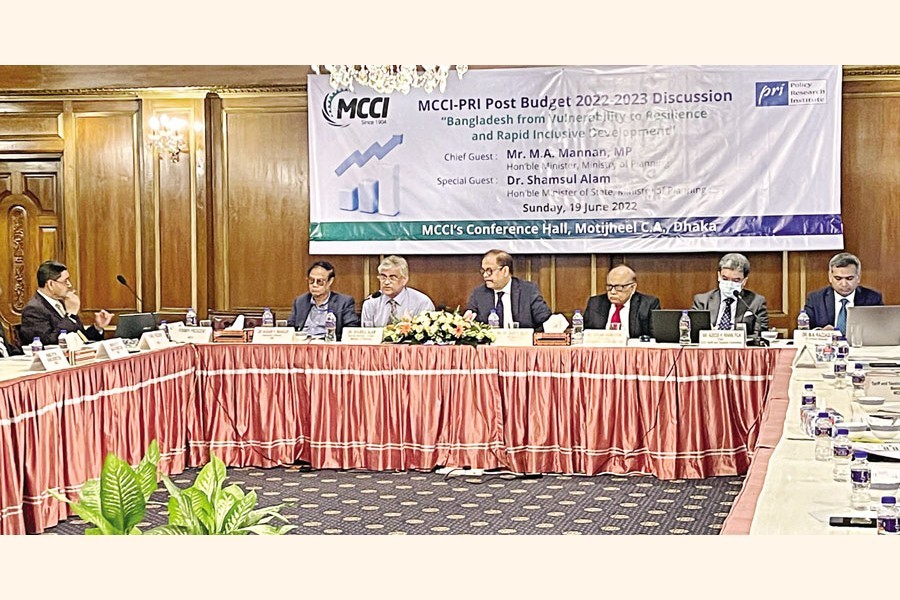Speakers at a post-budget discussion in the city on Sunday highlighted a number of challenges in the upcoming fiscal year, including inflationary pressure and giving additional subsidies to meet the budget deficit.
They welcomed lowering of the corporate tax rate for the both listed and non-listed companies, although the conditions set for the lower rates may be difficult to meet for most of the businesses.
Among the discussants were economists and business leaders at the event styled ‘Bangladesh from Vulnerability to Resilience and Rapid Inclusive Development’ organasied by the premier chamber body - MCCI-Dhaka and the Policy Research Institute of Bangladesh (PRI).
Planning Minister MA Mannan as the chief guest joined the meeting held at the MCCI's Motijheel office virtually while State Minister for Planning Dr Shamsul Alam attended it in person as special guest.
The planning minister said the BBS (Bangladesh Bureau of Statistics) has a wide range of goods and services in its basket while measuring the consumer price index. But the think tank considers a focused group. He said the think tank considers essential goods that the poor consume.
The minister added the government may expand the IMED (Implementation Monitoring and Evaluation Division) offices at the district level for more efficient monitoring and evaluation of the government development activities.
He said food subsidy will continue considering the adverse situation from the price surge in the international market.
State Minister for Planning Dr Shamsul Alam said as per the IMF and World Bank statistics fuel prices increased by 65 per cent, natural gas by 236 per cent and soybean oil by 29 per cent.
He added export has risen by 35 per cent and import by 45 per cent, which is a good sign for the economy.
He said as per the 8th Five Year Plan, the budget is smaller as the government has decreased allocations.
PRI executive director Dr Ahsan H Mansur said there are four challenges looming in the next year's budget. "To my mind, the revenue target is very much high and cannot be achieved".
Dr Mansur said the subsidy bill is huge, adding the government is providing huge subsidy while importing fertiliser. "The government is now giving Tk100 more per kilogram urea. How long will the situation go on?"
Dr Mansur was critical of the financing side of the budget as the government will borrow more than Tk1.0 trillion from the banking sector.
He hinted that this may crate crowding out effect on the economy as the money market is facing liquidity problem.
"The pension liability has been growing up. And the wages and salaries for the public servant are also on the rise," he said.
PRI chairman Dr Zaidi Sattar said Bangladesh began its journey in 1972 with a per capita income of less than $100. Its GDP was only $7.0 billion with some 75 per cent of the population of 70 million known to be living in poverty.
"By the end of the fiscal year 2023, we expect Bangladesh GDP to cross half a trillion US dollars with per capita income more than 28 times what it was in 1972," he said.
The march to the LDC graduation in 2026 remains intact despite the onslaught of the Covid pandemic and the impacts of the Russia-Ukraine War, Dr Sattar noted.
Dr Sattar said built on the strong macroeconomic foundations of the past 30 years, three five-year plans (6th, 7th, and 8th) and two Perspective Plans (2021 and 2041) have laid down the road map for rapid inclusive growth building on the notable achievements particularly in the past decade.
Dr Zaidi Sattar co-chaired the programme from Princeton of the New Jersey thorough Zoom network while another co-chair and MCCI president Md Saiful Islam attended it in person.
The MCCI president said they are also happy to see the government lower the corporate tax rate for both listed and non-listed companies, although the conditions set for these lower rates may be difficult to meet for most businesses.
He said: "We laud the government for allowing VAT exemption on the supply of goods under subcontract between the manufacturing units when both are enjoying bonded facilities. It should be applicable to all export-oriented industries".
He said looking towards the future, the budgetary provision for a study on central bank digital currency and exploring the means to introduce digital banks looks timely.
Like two sides of every coin, many areas in this budget have a lot of room for improvement as far as the business community's needs are concerned.
The allocation for social safety nets is one such area. Yes, there has been an increase in the allocation from Tk. 1.08 trillion in FY22 to Tk. 1.14 trillion considering the twin effects of the Russia-Ukraine war and the pandemic.
The MCCI president said considering the increase in per capita income to $2,824, the personal income tax threshold should be increased to Tk 400,000.
Dr. MA Razzaque, research director of the PRI, presented keynote paper along with Adib H Khan.
Dr Razzaque said the FY national budget was announced amid external shocks and uncertainties - Ukraine-Russia war and rising inflation.
He said the major challenges of the budget are: containing inflation and enhancing domestic investment, financing additional subsidy, utilising funds from foreign assistance, completion of education and health projects timely, increasing local VAT and the number of individual tax-payers and stabilising the exchange rate.
He said the actual budget spending has just been around 80 per cent since the FY 2015.


